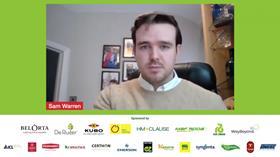
More than 2,000 delegates tuned in for this week’s Global Tomato Congress to discover the latest trends in the tomato category, as well as to connect, discuss ideas and do business.
Davide Perotto, consumer insight director at Europanel, kicked the event off with an overview of the European tomato market, including the impact of Covid-19.
Despite the many challenges, he revealed, tomatoes had benefited from various restrictions introduced to combat the pandemic and from new habits formed at home.
“The question is,” he said, “how can we as manufacturers of foods and brands ensure that those newly created habits stick in the future?”
In 2020, he revealed, an additional 1m shoppers purchased tomatoes, with volumes sold rising by 172,000 tonnes, generating an extra €646m in revenue.
“But what drove this positive performance?” he asked. “If we look at the change versus last year, we can clearly see how plum tomatoes are the driving force in the category in Europe, although all tomato varieties experienced growth in 2020.”
Growth in value, he revealed, was coming from increased consumption by existing shoppers. “In fact, the category as a whole is actually losing shoppers year on year,” he explained, “but still growing its value as shoppers pick up the product more often and in a bigger quantity.”
“The increase in average price is also having a positive impact,” he continued, “with premiumisation happening across all varieties. Cherry tomatoes are those that drove consumption the most, probably given their snackability. In fact, we’ve seen snacking occasions grow significantly in 2020 due to Covid restrictions.”
Looking forward, Perotto said that although a recession was likely in Europe, the FMCG sector was expected to continue to grow. “This growth could be even stronger with working and studying from home becoming long-term solutions,” he added.
Premiumisation accelerating
Sam Warren, senior fresh produce buyer at retailer Sainsbury’s, concurred that the past year had significantly accelerated the existing trend of premiumisation in the category.
“We categorise what’s happened in the last 12 months as accelerating five years’ worth of development into a year,” he said. “So a lot of this behaviour would have happened anyway, but it wouldn’t have been until the mid-2020s. Premiumisation has been a trend over the last three or four years, but it’s just been massively enhanced in the last 12 months.”
Concerning sustainability, Warren repeated the retailer’s commitment to reach net zero by 2040 and revealed that the company had already achieved 20 per cent of its plastic reduction target.
“We’re working really closely with our supply base to turn over every stone possible to find out how we can strip out plastic packaging, how we can make the production more sustainable,” he said. “How do we work with suppliers and how do we develop commercial relationships for the medium and long term where suppliers have got the confidence to invest in new technology, knowing that the business with Sainsbury’s is going to be on an ongoing basis? There’s mutual benefit to be had there.
“I’ve been hugely impressed by a lot of suppliers that have got sustainable water sources, sustainable heating, lighting,' he added. 'It’s really quite advanced stuff. And we want to make sure we continue to work with the right suppliers to advance that.”



